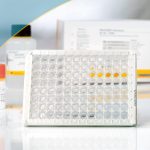Infection with the stomach bacteria Helicobacter pylori is the most common cause of stomach inflammation (gastritis). Yet, these widespread bacteria can also cause many other diseases—possibly even Parkinson’s disease.
Several clinical studies suggest that these bacteria, with which more than half of the world’s population is infected, can promote the nervous system disorder Parkinson’s disease. For example, Professor Dr. David J. McGee’s team at LSU Health Sciences Center in Shreveport identified four links between Helicobacter infections and Parkinson’s disease (source):
- Parkinson’s patients have a one- to three-fold elevated risk of having a H. pylori infection compared to healthy comparators.
- Parkinson’s patients who are infected with H. pylori have worse motor functions than non-infected Parkinson’s patients.
- Eradication of H. pylori improves the motor skills in Parkinson’s patients.
- Eradication of H. pylori improves the absorption of the Parkinson’s medication levodopa.
The exact process of how Parkinson’s disease develops is not yet fully understood. In fact, several factors may be involved: the toxins produced by the bacteria, the disruption of the microbiome, the spread of inflammation to the nervous tissue, and the manipulation of the pharmacokinetics in Parkinson’s patients by the bacteria. The last item is of particular interest for Parkinson’s therapy: The drug L-dopa (levodopa) is used in dopamine replacement therapy to treat motor fluctuations and impulse control disorders. It has been shown that Parkinson’s patients infected with Helicobacter pylori have a greater need for levodopa medication than patients who do not have a Helicobacter infection: Levodopa works worse in patients with a Helicobacter infection. Also, the duration of effect of levodopa is reduced and the effect delayed with a Helicobacter infection. The reason: Levodopa acts as a nutrient for the bacteria.
In Parkinson’s patients who respond poorly to levodopa therapy, it is, therefore, recommended to test for a possible Helicobacter infection and to eradicate the bacteria, if found.









